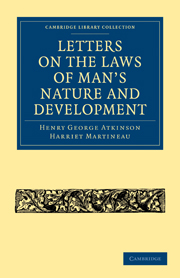Book contents
- Frontmatter
- Preface
- Mottoes
- Contents
- Letter. 1 Inquiry for a Basis
- Letter. 2 Proposal of a Basis
- Letter. 3 Preparation of the Ground
- Letter. 4 What is the Brain?
- Letter. 5 Inquiry about its Structure
- Letter. 6 Early days of Phrenology
- Letter. 7 Inquiry for New Discoveries
- Letter. 8 Methods of New Discovery. Organic Arrangement of the Brain
- Letter. 9 Illustrative Cases
- Letter. 10 Organic Arrangement of the Cerebrum
- Letter. 11 Dr. Howe's Report on Idiocy
- Letter. 12 The Senses and Nervous System
- Letter. 13 Illustrative Comment
- Letter. 14 Facts about the Senses under various conditions
- Letter. 15 Raising questions
- Letter. 16 Bacon, on Matter and Causation. Inferences and Dreams. Association of Ideas
- Letter. 17 Nothing
- Letter. 18 Knowledge and Notions. Results of each
- Letter. 19 Release from Notions. Entrance upon Knowledge
- Letter. 20 Natural History of Superstition
- Letter. 21 Theology and Science
- Letter. 22 Central Law and Pervasive Unity. Light. Sense of Identity. Ghost-seeing. Unrevealed Human Relations
- Letter. 23 Position and Privilege of Truth-seekers
- Letter. 24 Position and Privilege of Truth-speakers
- Appendix
Letter. 20 - Natural History of Superstition
Published online by Cambridge University Press: 29 August 2010
- Frontmatter
- Preface
- Mottoes
- Contents
- Letter. 1 Inquiry for a Basis
- Letter. 2 Proposal of a Basis
- Letter. 3 Preparation of the Ground
- Letter. 4 What is the Brain?
- Letter. 5 Inquiry about its Structure
- Letter. 6 Early days of Phrenology
- Letter. 7 Inquiry for New Discoveries
- Letter. 8 Methods of New Discovery. Organic Arrangement of the Brain
- Letter. 9 Illustrative Cases
- Letter. 10 Organic Arrangement of the Cerebrum
- Letter. 11 Dr. Howe's Report on Idiocy
- Letter. 12 The Senses and Nervous System
- Letter. 13 Illustrative Comment
- Letter. 14 Facts about the Senses under various conditions
- Letter. 15 Raising questions
- Letter. 16 Bacon, on Matter and Causation. Inferences and Dreams. Association of Ideas
- Letter. 17 Nothing
- Letter. 18 Knowledge and Notions. Results of each
- Letter. 19 Release from Notions. Entrance upon Knowledge
- Letter. 20 Natural History of Superstition
- Letter. 21 Theology and Science
- Letter. 22 Central Law and Pervasive Unity. Light. Sense of Identity. Ghost-seeing. Unrevealed Human Relations
- Letter. 23 Position and Privilege of Truth-seekers
- Letter. 24 Position and Privilege of Truth-speakers
- Appendix
Summary
H. G. A. to H. M.
I will look at those passages you refer to in Sir J. Mackintosh's Diary the first opportunity. Atheism and Materialism are terms used by vulgar minds to frighten the ignorant. “We fool ourselves with our own fopperies and inventions, like children who are frightened with the same face of their playfellow, that they themselves have smeared and smutted.” Vulgar men strive to raise themselves by degrading others; and when they are foiled by reason, they swear and use bad names. To say that a man is an Atheist is to “smear and smut” his reputation, and to cause him to be avoided with fear and disgust, as if he were possessed of the plague, or were a murderer, and devourer of human flesh. Every theologian, though differing from other theologians, assumes that he is in the true faith, and worships the true God; and that his faith is a revelation proved by miracles; and he conceives, with a strange appearance of presumption, that he is called upon to abuse all the rest of the world, and to strive to convert them to his particular faith, that they may partake of its advantages. But we must judge of the tree by its fruits, and not by its promises. Men have faith enough; but not in the best things. It is not faith that is wanted, but knowledge. Faith will not give knowledge, but knowledge will give faith, and elevate its character.
- Type
- Chapter
- Information
- Letters on the Laws of Man's Nature and Development , pp. 223 - 244Publisher: Cambridge University PressPrint publication year: 2009First published in: 1851



